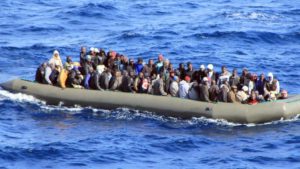 I’m looking for rubber dinosaurs. My nephews are obsessed with them. Seems like I’m in the right place, Walmart in Ontario, Oregon, a high desert town in onion, potato and sugar beet country on the Snake River, right up against Idaho. I pass a shelf piled with little green soldiers in clear plastic bags. I turn a corner, where there’s a stack of basketballs in cardboard boxes, and there is Seynab (not her real name)—this woman I know from Mogadishu, Somalia’s ruined capital city on the Indian Ocean in East Africa. She’s crouching at the end of the aisle, covered from head to toe in a great pink shawl, some of the cloth spilling across the floor behind her, except for her hands and wrists. She’s price-tagging rubber dinosaurs, quickly plucking an animal off the shelf in her left hand, price gun in her right, turning each over to find a surface for the sticker: Tyrannosaurus rex, Velociraptor, Spinosaurus, and Brachiosaurus, the one with the incredibly long neck. She holds Brachio up to me and smiles, a mouth of clean and crooked teeth. Later, at her other job at an agency where she translates for Arabic speaking refugees, she explains to me how she got here, about refugee camps in Ethiopia and Libya, and a sinking rubber boat in the Mediterranean Sea. “One hundred people,” she says. She makes fists and punches at the air, “no food, no water, people fighting.” Her fists turn to claws, swiping, grasping. “We were five days in the water. Water was filling the boat. I was two months pregnant.” She laughs now. “A big blue boat came for us. Italian Navy.”
I’m looking for rubber dinosaurs. My nephews are obsessed with them. Seems like I’m in the right place, Walmart in Ontario, Oregon, a high desert town in onion, potato and sugar beet country on the Snake River, right up against Idaho. I pass a shelf piled with little green soldiers in clear plastic bags. I turn a corner, where there’s a stack of basketballs in cardboard boxes, and there is Seynab (not her real name)—this woman I know from Mogadishu, Somalia’s ruined capital city on the Indian Ocean in East Africa. She’s crouching at the end of the aisle, covered from head to toe in a great pink shawl, some of the cloth spilling across the floor behind her, except for her hands and wrists. She’s price-tagging rubber dinosaurs, quickly plucking an animal off the shelf in her left hand, price gun in her right, turning each over to find a surface for the sticker: Tyrannosaurus rex, Velociraptor, Spinosaurus, and Brachiosaurus, the one with the incredibly long neck. She holds Brachio up to me and smiles, a mouth of clean and crooked teeth. Later, at her other job at an agency where she translates for Arabic speaking refugees, she explains to me how she got here, about refugee camps in Ethiopia and Libya, and a sinking rubber boat in the Mediterranean Sea. “One hundred people,” she says. She makes fists and punches at the air, “no food, no water, people fighting.” Her fists turn to claws, swiping, grasping. “We were five days in the water. Water was filling the boat. I was two months pregnant.” She laughs now. “A big blue boat came for us. Italian Navy.”